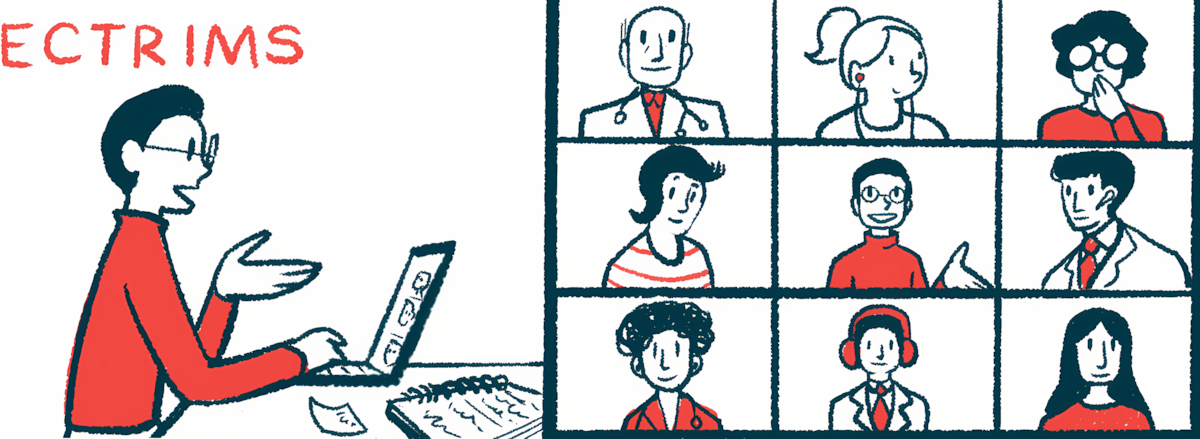ECTRIMS 2025: Briumvi keeps MS patients relapse-free for 6 years
Disability progression rate low in patients with RRMS
Written by |

Up to six years of continuous treatment with Briumvi (ublituximab) led to sustained reductions in relapse rates and a low rate of disability progression in people with relapsing forms of multiple sclerosis (MS), with no new safety concerns reported.
That’s according to new long-term data from the ULTIMATE I (NCT03277261) and ULTIMATE II (NCT03277248) Phase 3 trials and their open-label extension (NCT04130997).
About 10% of patients on continuous Briumvi experienced confirmed disability progression (CDP) after six years, while 17% achieved confirmed disability improvement (CDI), meaning their disability lessened over time.
Both relapses and disability measures continued to favor the continuous Briumvi group over patients who initially received Aubagio (teriflunomide) before switching to Briumvi two years later in the extension.
“We are extremely pleased to share six years of continuous Briumvi treatment data demonstrating that nearly 90% of patients on Briumvi remained free from disability progression, coupled with one of the lowest relapse rates ever reported in a Phase 3 [relapsing] MS study,” Michael Weiss, CEO of TG Therapeutics, the therapy’s developer, said in a company press release.
Evidence ‘strongly supports use’
Bruce Cree, MD, PhD, professor of neurology at the University of California San Francisco Weill Institute for Neurosciences, said the data “strongly supports use of [Briumvi] in clinical practice.”
Cree presented the findings at the 41st Congress of the European Committee for Treatment and Research in Multiple Sclerosis (ECTRIMS), held Sept. 24-26 in Barcelona, Spain, in a talk titled, “Long-Term Efficacy and Safety of Ublituximab in Relapsing Multiple Sclerosis: Results from 6 Years of ULTIMATE I and II Open-Label Extension.” The work was funded by TG Therapeutics.
Briumvi is a CD20 inhibitor that is approved in the U.S. to treat relapsing forms of MS. Its approval was based on data from the two-year-long ULTIMATE trials, in which Briumvi significantly lowered relapse rates compared with Aubagio.
After completing the main trials, participants had the option to continue into the open-label extension, where all are being treated with Briumvi and monitored for long-term outcomes.
Data presented at ECTRIMS last year showed that, after five years of continuous Briumvi treatment, the average relapse rate was 0.02 per year, which corresponds to about one relapse every 50 years.
Cree showed that the annual relapse rate was even lower at six years — 0.012, which works out to about one relapse every 83 years. This “basically means that the vast majority of patients, unless they happen to be extraordinarily long-lived, will simply never experience a relapse,” Cree said.
Over six years on Briumvi, 10.1% of patients experienced CDP, defined as an increase in scores on the Expanded Disability Status Scale (EDSS) that is sustained for at least six months. At the same time, 17% of patients experienced a CDI, or a sustained decrease in EDSS scores.
In patients who first received Aubagio, rates of relapses and disability worsening were also low, though not as low as with continuous Briumvi. This group had an average of 0.032 relapses per year over six years, and 15.9% experienced CDP, while 13.3% achieved CDI.
Cree said the overall less favorable outcomes for patients initially given Aubagio “underscore the benefit of early treatment with [Briumvi] compared to delayed treatment.”
Safety data from the sixth year of follow-up were consistent with earlier findings.
Briumvi is designed to deplete B-cells, a type of immune cell with a central role in MS. The therapy is administered by infusion into the bloodstream. Under the approved dosing schedule, patients first receive a 150 mg infusion, then a 450 mg infusion two weeks later. Subsequent infusions of 450 mg are given every six months thereafter.
An ongoing Phase 3 clinical trial called ENHANCE (NCT05877963) is testing a modified dose regimen where patients receive one initial infusion of 600 mg, rather than two separate infusions two weeks apart. This “may improve patient convenience and create greater efficiency for providers,” researchers wrote.
Interim data from ENHANCE, presented at ECTRIMS in the poster, “Safety and Tolerability of a Modified Ublituximab Dosing Regimen: Updates from the ENHANCE Study,” indicated that the single 600 mg infusion of Briumvi is generally well tolerated.
Infusion-related reactions — side effects such as throat irritation or headache that develop during or just after the infusion — were reported at much lower rates when the infusion was done over the course of four hours rather than at faster speeds, so the researchers noted that future testing will use this speed of infusion. In all patients, these reactions resolved completely.
Data from ENHANCE also showed that the single 600 mg infusion of Briumvi is effective at depleting B-cells. The ongoing study is still enrolling adults with relapsing forms of MS at sites in the U.S. and Poland.
Note: The Multiple Sclerosis News Today team is providing live coverage of the 41st Congress of the European Committee for Treatment and Research in Multiple Sclerosis (ECTRIMS) Sept. 24-26. Go here to see the latest stories from the conference.



